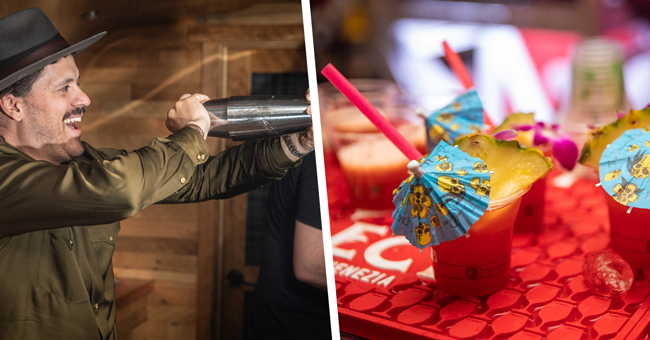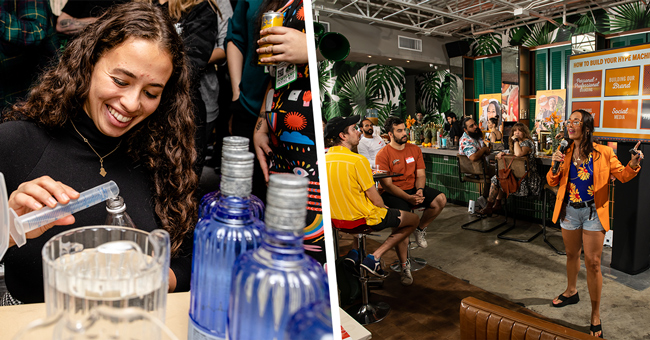Last weekend, cocktail fans, professionals and mixologists from some of the most acclaimed bars in the world descended on Phoenix for the 11th annual Arizona Cocktail Weekend. It’s just one of several regional cocktail summits that have stewarded cocktail movements across the country, but also part of a growing trend within industry events that has shifted away from teaching cocktail techniques to broader education.
Like other smaller U.S. cities, Phoenix’s cocktail landscape looked different when Ross Simon, founder of Arizona Cocktail Weekend, opened his first bar in 2009. At that time, he recalls, there weren’t many cocktail bars doing well in the state.
“It’s a night and day difference nowadays, and that’s through educating the bartenders, educating the clientele, and now guests demanding to drink better,” he said.
Simon is now the head bartender and owner of one of Arizona’s most awarded lounges, Bitter & Twisted Cocktail Parlour. In the past decade Phoenix’s cocktail scene has flourished: the city is now also home to New York’s Ghost Donkey, the hyped railroad cabin-styled Platform 18, and Garden Bar, designed by a James Beard-honored mixologist. Cocktail enthusiasts can also now enjoy one of the country’s top cocktail summits right in their backyard too, featuring pop-up bars from around the country and a mixologist showdown.
But the programming at Arizona Cocktail Weekend has also grown to offer more industry-specific education: in addition to cocktail tasting events, lead bartenders now teach flavor layering techniques or deep-dives on hospitality. Other cocktail summits have picked up after the pandemic too. The Third Coast Cocktail Summit launched this January in San Antonio, Texas with a mix of consumer and industry events.
Since the pandemic shuttered restaurant and bars, programming at cocktail events has shifted even further. Nearly 2 million jobs in hospitality and leisure remain unfilled since the start of the pandemic, which helped put a spotlight on many of the issues facing bar owners and workers in what was already a fickle industry.
“Mindsets have changed, and different subjects and avenues have had to be addressed, whether that’s profitability, how to survive increased costs, or how to pivot in a pinch in regards to operations,” Simon said.
From Cocktails to Business Plans
That educational track mirrors what some events have been pursuing even before the pandemic. Portland Cocktail Week was started in 2009 by Lush Life Productions, a bartender advocacy agency. Each year, more than 2,500 bartenders from across the country attend free classes, many of them focused on the business side of the bar.
‘’Basically, all the education is focused on making sure that bartenders know what is available to them and provides them with information to take the next step in their careers,” said Lindsey Johnson, founder and CEO of Lush Life Productions.
A shift from cocktail education to more holistic programming has happened across events, according to Anna Mains, U.S. brand ambassador for scotch whisky Monkey Shoulder. When regional events sprung up, access to mixology training and trends was limited, but now “you can go online and learn any sort of cocktail technique at a pretty deep level.” Social media networks and national events like Tales of the Cocktail and Bar Convent Brooklyn, which bring in several times the crowd, also connect industry professionals to resources and each other. But smaller events can facilitate one-on-one relationships with more ease, she said.
“It’s a cool evolution to see more focus on what are actual skills that you really can’t teach a person online that have to do with investing in them more as a whole and beyond the bar,” she said.
Shaking Up Brand Education
At the two day-long Money Business Academy at Portland Cocktail Week, Mains offers guests courses on personal branding, practical emergency fixes behind the bar, and PR tool kits including headshots. Spending dollars on brand-agnostic presentations isn’t always seen as a priority for leadership, she said, so events like these often push brand ambassadors to get creative.
“Very often there’s the tension between how do we get our product in front of people in a way that is beneficial to the brand and have them leaving excited about the brand, and how is the information we want to present also offering education, tools, knowledge that best serve the audience?” Johnson said.
Finding a balance may be one way for brands to stand out in a crowded industry, now made up of 2,600 American distilleries according to the Distilled Spirits Council of the United States, plus imported spirits. Many of the classes at Portland Cocktail Week showcase new offerings or tastings, but several put the brand slightly in the background.
“I honestly believe that the classes and the education are the things that pay off the most in the long run,” said Mains. “If we say that we believe in building this trade, well then let’s do things that help lift attendees up as a person, because you want them to be able to last and sustain themselves in the industry.”
That trajectory mirrors a shift from some of the top spirit brands in the country. Campari and Diageo pivoted their in-person academies online at the start of the pandemic, aiming to help more industry professionals to connect and optimize their skills and businesses for reopenings. Beam Suntory revamped its online hub, The Blend, in 2021 as a professional-development support system with mentorship resources and educational content.
Career counseling is a staple feature of the Portland event, as today new entrants into bartending are much more aware of the various roles in the industry than prior generations, said Johnson.
On-the-ground access can also help brands understand culture shifts in the industry, which now include conversations about mental-health, equity, and career paths. Attendees at the event also go through more non-alcoholic drinks than alcohol.
“Bartenders take care of themselves more in general now, whether that be their mental or physical health,” said Johnson. “They’re just much more mindful of themselves and protecting their futures.”

